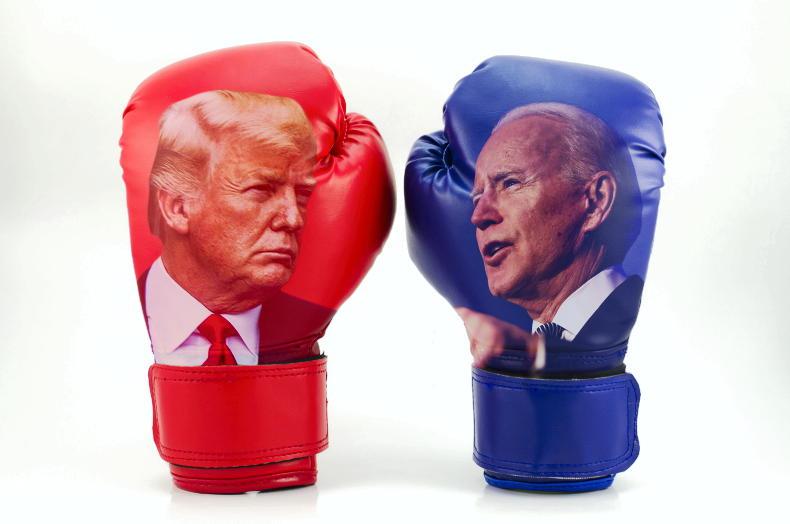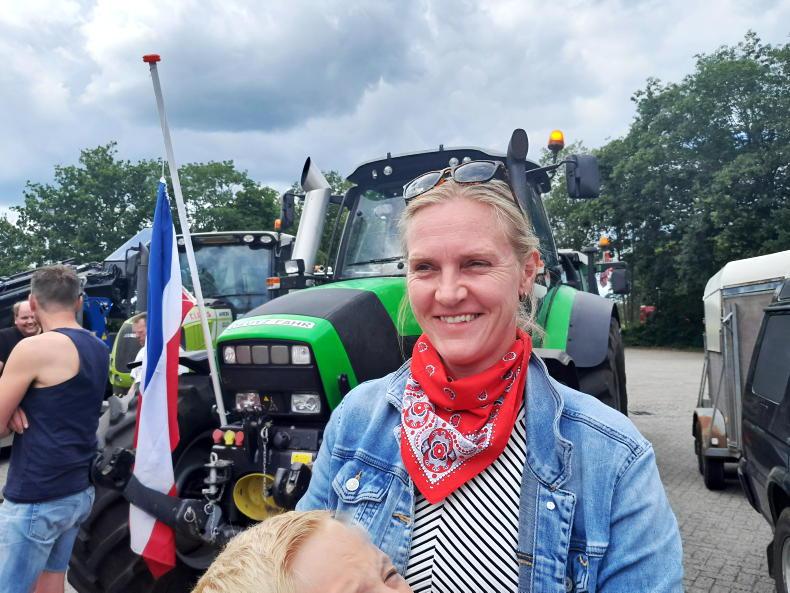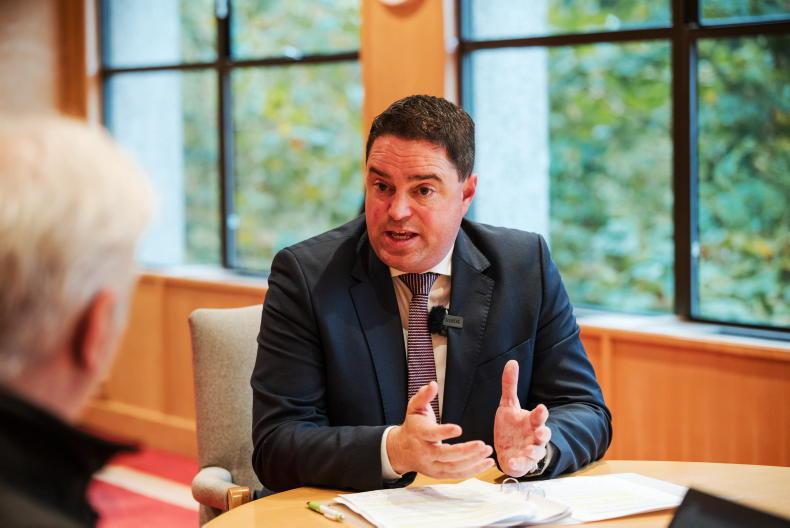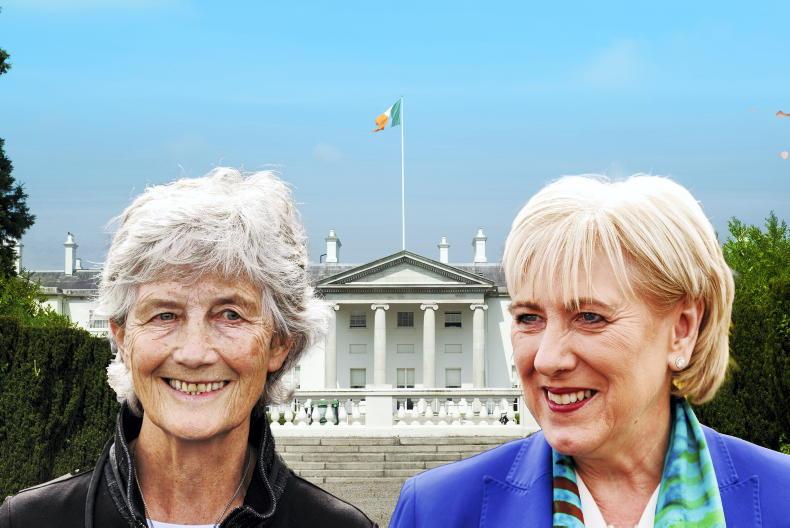There’s been a quite a reaction here in Ireland to the Dutch regional and senate elections, particularly in rural Ireland.
Politicians are trying to digest the meaning of it all. We asked some independent TD’s from each of the three groupings in the Dail for their reaction in this week’s paper.
If there is to be a discernible rural movement or party in representative politics, I sincerely hope it focuses on the issues, and avoids getting sucked into a divisive ideological battle. Ireland would do well to avoid the culture wars that have bedevilled politics in so many other countries.
It remains to be seen how the BBB - the farmer party that will now have 17 of the 75 seats in the Dutch senate - spends the political capital it gained in the election 10 days ago, when it won 20% of the first-preference vote.
The party has been endorsed by figures from the far right like Marie Le Pen in France and the Italian prime minister Giorgia Meloni, but that doesn’t mean it will evolve into a far-right party. We shall have to wait and see.
Clowns to the left of me, jokers to the right
What we did see this week is where culture wars and their propagators bring societies.
In the UK, Boris Johnson is the definition of a populist, a man who has always campaigned on ideas (more notions, really) about what the UK is and should be than policies.

Boris Johnsn. \ REUTERS/Dylan Martinez
Boris has had a torrid few days. His appearance before the privileges committee of the House of Commons was revealing, as he blustered and bluffed his way through questioning around his behaviour and decision-making during lockdowns he presided over as prime minister.
As admissions and apologies were slowly wrung from him, Johnson switched from flippancy to anger and back.
Meanwhile, and far more importantly, he found time on Wednesday evening to vote against the government he recently led on the Windsor framework, the legislation agreed between the EU and UK to improve trading protocols, particularly on this island.
Both Boris Johnson and Liz Truss were among the 22 Tories who voted against what is essentially an evolution of the ‘oven-ready’ deal they negotiated and campaigned on in 2019.
It means that seven years from the Brexit vote, the negative effects of that culture war battle continue to be felt across these islands.
Meanwhile, on the other side of the pond, Donald Trump and his fanatical support base are braced for his possible arrest and indictment.

The US, regarded as the bastion of the “free world”, witnessed an attempted putsch when Trump was defeated in the 2020 elections.
The fact that the US people can’t even agree on the significance of the 6 January assault on the Capitol should warn us all against straying from the boring but essential business of the issues.
Ideology in moderation
That is not to suggest that rural Ireland is expected to think like urban Dublin.
The Saw Doctors will never look or sound like Aslan. The Ploughing Championships aren’t for everyone, and neither is the Dublin Fringe festival.
We all think differently, we all see the world through the prism of our own experience and circumstances.
And there really are genuine issues around the future of farming and food production, land use, rural transport, rural planning, and how we distribute resources across society.
And there is the potential for a coherent political grouping from rural Ireland to focus on those issues.
But we really can’t afford to turn such a debate into an “us and them” divide. And we can’t think that farming can escape its responsibilities as a sector.
The IPCC this week reminded us of the stakes that are being played for, and we all have to play the hand we’re dealt, not just for our own betterment, but for the common good, particularly for our children.
There are two very opposing perspectives out there in Irish society regarding farming.
Some people say farming is just guilty of special pleading, that our food production is absolutely irrelevant in a global context.
Becoming world leaders in achieving carbon neutrality from land use would be a far more important service to humanity and the planet.
Then there are those in the opposite corner who say that Ireland’s emissions don’t matter a fig in a global context.
On the other hand, our ability to harness the combination of land-base and climate to produce enough food that means we export 90% of our meat and milk all over the planet is very significant.
And there is the argument that reducing that output would only see production move to less carbon-efficient production systems elsewhere, a negative for the planet.
Middle ground
The truth, as always, lies somewhere in between. Irish food production is indeed significant, but must evolve towards carbon neutrality.
The debate needs to about the pace of change and the resources devoted to developing efficiencies and sustainability.
Realistically, we need political stability and societal stability to achieve anything approaching carbon neutrality in 25 years
There are those who would hold that if all of Irish society can change itself dramatically to combat a pandemic, then surely farmers can make similar and drastic changes to help avoid a climate breakdown.
The difference for me is that lockdown, while an extreme change in people’s daily lifestyle, was always intended to be a temporary one.
In contrast, the changes we need to make to combat climate change are permanent ones. That requires an entirely different type of buy-in.
The reality is that we have no hope of achieving the level of change in how we live unless there is buy-in from society.
Realistically, we need political stability and societal stability to achieve anything approaching carbon neutrality in 25 years.
And not just in Ireland, not just across the European Union, but across the entire planet. Ironically, it might be easier to achieve in more autocratic, less democratic societies, if the leadership of such nations want to strive for it.
One thing is for sure. If we want societal stability, if we want political stability, we surely need a modicum of economic stability, and political stability. Hearts (and heads), no Trumps.
The two-trillion timebomb
There is another elephant in the room. Every year, a significant proportion of the world’s resources is gobbled up by military spending.
This has to be confronted, just as food production and fossil fuels have to be confronted.
I have no idea of the carbon footprint of the armaments industry, but how many of the world’s leading scientists and researchers in the world’s most cutting-edge laboratories are focused on building better weapons and/or defence systems?
How much more quickly would we develop technologies that would evolve or perhaps even transform the footprint of food production if even a proportion of such resources were redeployed.
I’m not naive, I know the world needs weapons. The old saying that the only cure for a bad guy with a gun is a good guy with a bigger gun might be ultimately true, but how many of the weapons developed in the west end up in the hands of despots who oppress their own people or threaten their neighbours?
The simple truth is that if we are going to save the planet, we have to change the way we live
Would the world be a safer as well as a better place if a proportion of the €2 trillion spent globally on military spending in 2022 alone had been spent on making life better for the most disadvantaged of the world.
Two trillion euros. That’s a huge figure, it looks like this -€2,000,000,000,000.
For context, the entire Irish economy in 2022 (gross domestic product) was worth around €485 billion euros, the US economy somewhere shy of €20 trillion.
This is not deflection or whataboutery. The simple truth is that if we are going to save the planet, we have to change the way we live.
The IPCC report this week repeated that message, and with an ever-greater sense of urgency as time is getting short to prevent the 1.5°C “tipping point”.
It won’t be enough to drive electric cars and eat less meat or no meat.
It certainly won’t be enough to just stop producing food in the EU and import it instead - consumption patterns will have to evolve at least as quickly as food production.
But without a more stable world, with many more stable and just societies, we’re not going to hit those targets.
Maybe we need to build fewer guns, and build a few more bridges instead.
If culture wars are no good for farmers or consumers, actual wars are worse.
There’s been a quite a reaction here in Ireland to the Dutch regional and senate elections, particularly in rural Ireland.
Politicians are trying to digest the meaning of it all. We asked some independent TD’s from each of the three groupings in the Dail for their reaction in this week’s paper.
If there is to be a discernible rural movement or party in representative politics, I sincerely hope it focuses on the issues, and avoids getting sucked into a divisive ideological battle. Ireland would do well to avoid the culture wars that have bedevilled politics in so many other countries.
It remains to be seen how the BBB - the farmer party that will now have 17 of the 75 seats in the Dutch senate - spends the political capital it gained in the election 10 days ago, when it won 20% of the first-preference vote.
The party has been endorsed by figures from the far right like Marie Le Pen in France and the Italian prime minister Giorgia Meloni, but that doesn’t mean it will evolve into a far-right party. We shall have to wait and see.
Clowns to the left of me, jokers to the right
What we did see this week is where culture wars and their propagators bring societies.
In the UK, Boris Johnson is the definition of a populist, a man who has always campaigned on ideas (more notions, really) about what the UK is and should be than policies.

Boris Johnsn. \ REUTERS/Dylan Martinez
Boris has had a torrid few days. His appearance before the privileges committee of the House of Commons was revealing, as he blustered and bluffed his way through questioning around his behaviour and decision-making during lockdowns he presided over as prime minister.
As admissions and apologies were slowly wrung from him, Johnson switched from flippancy to anger and back.
Meanwhile, and far more importantly, he found time on Wednesday evening to vote against the government he recently led on the Windsor framework, the legislation agreed between the EU and UK to improve trading protocols, particularly on this island.
Both Boris Johnson and Liz Truss were among the 22 Tories who voted against what is essentially an evolution of the ‘oven-ready’ deal they negotiated and campaigned on in 2019.
It means that seven years from the Brexit vote, the negative effects of that culture war battle continue to be felt across these islands.
Meanwhile, on the other side of the pond, Donald Trump and his fanatical support base are braced for his possible arrest and indictment.

The US, regarded as the bastion of the “free world”, witnessed an attempted putsch when Trump was defeated in the 2020 elections.
The fact that the US people can’t even agree on the significance of the 6 January assault on the Capitol should warn us all against straying from the boring but essential business of the issues.
Ideology in moderation
That is not to suggest that rural Ireland is expected to think like urban Dublin.
The Saw Doctors will never look or sound like Aslan. The Ploughing Championships aren’t for everyone, and neither is the Dublin Fringe festival.
We all think differently, we all see the world through the prism of our own experience and circumstances.
And there really are genuine issues around the future of farming and food production, land use, rural transport, rural planning, and how we distribute resources across society.
And there is the potential for a coherent political grouping from rural Ireland to focus on those issues.
But we really can’t afford to turn such a debate into an “us and them” divide. And we can’t think that farming can escape its responsibilities as a sector.
The IPCC this week reminded us of the stakes that are being played for, and we all have to play the hand we’re dealt, not just for our own betterment, but for the common good, particularly for our children.
There are two very opposing perspectives out there in Irish society regarding farming.
Some people say farming is just guilty of special pleading, that our food production is absolutely irrelevant in a global context.
Becoming world leaders in achieving carbon neutrality from land use would be a far more important service to humanity and the planet.
Then there are those in the opposite corner who say that Ireland’s emissions don’t matter a fig in a global context.
On the other hand, our ability to harness the combination of land-base and climate to produce enough food that means we export 90% of our meat and milk all over the planet is very significant.
And there is the argument that reducing that output would only see production move to less carbon-efficient production systems elsewhere, a negative for the planet.
Middle ground
The truth, as always, lies somewhere in between. Irish food production is indeed significant, but must evolve towards carbon neutrality.
The debate needs to about the pace of change and the resources devoted to developing efficiencies and sustainability.
Realistically, we need political stability and societal stability to achieve anything approaching carbon neutrality in 25 years
There are those who would hold that if all of Irish society can change itself dramatically to combat a pandemic, then surely farmers can make similar and drastic changes to help avoid a climate breakdown.
The difference for me is that lockdown, while an extreme change in people’s daily lifestyle, was always intended to be a temporary one.
In contrast, the changes we need to make to combat climate change are permanent ones. That requires an entirely different type of buy-in.
The reality is that we have no hope of achieving the level of change in how we live unless there is buy-in from society.
Realistically, we need political stability and societal stability to achieve anything approaching carbon neutrality in 25 years.
And not just in Ireland, not just across the European Union, but across the entire planet. Ironically, it might be easier to achieve in more autocratic, less democratic societies, if the leadership of such nations want to strive for it.
One thing is for sure. If we want societal stability, if we want political stability, we surely need a modicum of economic stability, and political stability. Hearts (and heads), no Trumps.
The two-trillion timebomb
There is another elephant in the room. Every year, a significant proportion of the world’s resources is gobbled up by military spending.
This has to be confronted, just as food production and fossil fuels have to be confronted.
I have no idea of the carbon footprint of the armaments industry, but how many of the world’s leading scientists and researchers in the world’s most cutting-edge laboratories are focused on building better weapons and/or defence systems?
How much more quickly would we develop technologies that would evolve or perhaps even transform the footprint of food production if even a proportion of such resources were redeployed.
I’m not naive, I know the world needs weapons. The old saying that the only cure for a bad guy with a gun is a good guy with a bigger gun might be ultimately true, but how many of the weapons developed in the west end up in the hands of despots who oppress their own people or threaten their neighbours?
The simple truth is that if we are going to save the planet, we have to change the way we live
Would the world be a safer as well as a better place if a proportion of the €2 trillion spent globally on military spending in 2022 alone had been spent on making life better for the most disadvantaged of the world.
Two trillion euros. That’s a huge figure, it looks like this -€2,000,000,000,000.
For context, the entire Irish economy in 2022 (gross domestic product) was worth around €485 billion euros, the US economy somewhere shy of €20 trillion.
This is not deflection or whataboutery. The simple truth is that if we are going to save the planet, we have to change the way we live.
The IPCC report this week repeated that message, and with an ever-greater sense of urgency as time is getting short to prevent the 1.5°C “tipping point”.
It won’t be enough to drive electric cars and eat less meat or no meat.
It certainly won’t be enough to just stop producing food in the EU and import it instead - consumption patterns will have to evolve at least as quickly as food production.
But without a more stable world, with many more stable and just societies, we’re not going to hit those targets.
Maybe we need to build fewer guns, and build a few more bridges instead.
If culture wars are no good for farmers or consumers, actual wars are worse.











SHARING OPTIONS